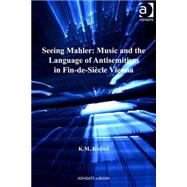Seeing Mahler: Music and the Language of Antisemitism in Fin-de-SiFcle Vienna
, by Knittel,K.M.- ISBN: 9780754663720 | 0754663728
- Cover: Hardcover
- Copyright: 8/22/2016
No one, of course, doubts that Gustav Mahler's tenure at the Vienna Court Opera from 1897-1907 was made extremely unpleasant by the antisemitic press, and it is relatively easy to find scathing comments - for example, from 1897, when the Reichspost wondered if 'the Jews' press' would still support Mahler's appointment once he began 'his Jew-boy antics at the podium'. The great biographer, Henry-Louis de La Grange, acknowledges that 'it must be said that anti-Semitism was a permanent feature of Viennese life'. Unfortunately, the focus on such blatant references to Jewishness has obscured the extent to which 'ordinary' attitudes about Jewish difference were prevalent and pervasive, yet subtle and covert. We have thus lost the context wherein such coded references to Jewishness would have been immediately understood.This study reconstructs what Mahler's audiences expected, saw, and heard, given the biases and beliefs of turn-of-the-century Vienna. Using newspaper reviews, cartoons and memoirs, Knittel has not set out to identify hostile discussions or overt attacks. Rather the book reveals how and to what extent authors call attention to Mahler's Jewishness and how those beliefs have been transmitted to - and unwittingly accepted by - modern scholars. It is not claimed that all reviews and cartoons can only be read in light of antisemitism; nor that antisemitism accounts for everything within them; nor that every single one of Mahler's reviewers was an antisemite. Knittel does not claim that what has been said about Mahler, then or now, is not valid but instead initiates a new focus of enquiry: that if there is even the slightest possibility that we have taken over a way of thinking about Mahler and his music from a culture that could not escape their own preconceptions of Jewishness - and whose criticism and perceptions therefore reflect their own unease rather than 'objective' reactions to his music - then we owe it to Mahler to rethink what makes his music unique, thought-provoking, and valuable.







